Seetel CEO R Seelige-Steinhoff on Berlin financial aid that does not help at all
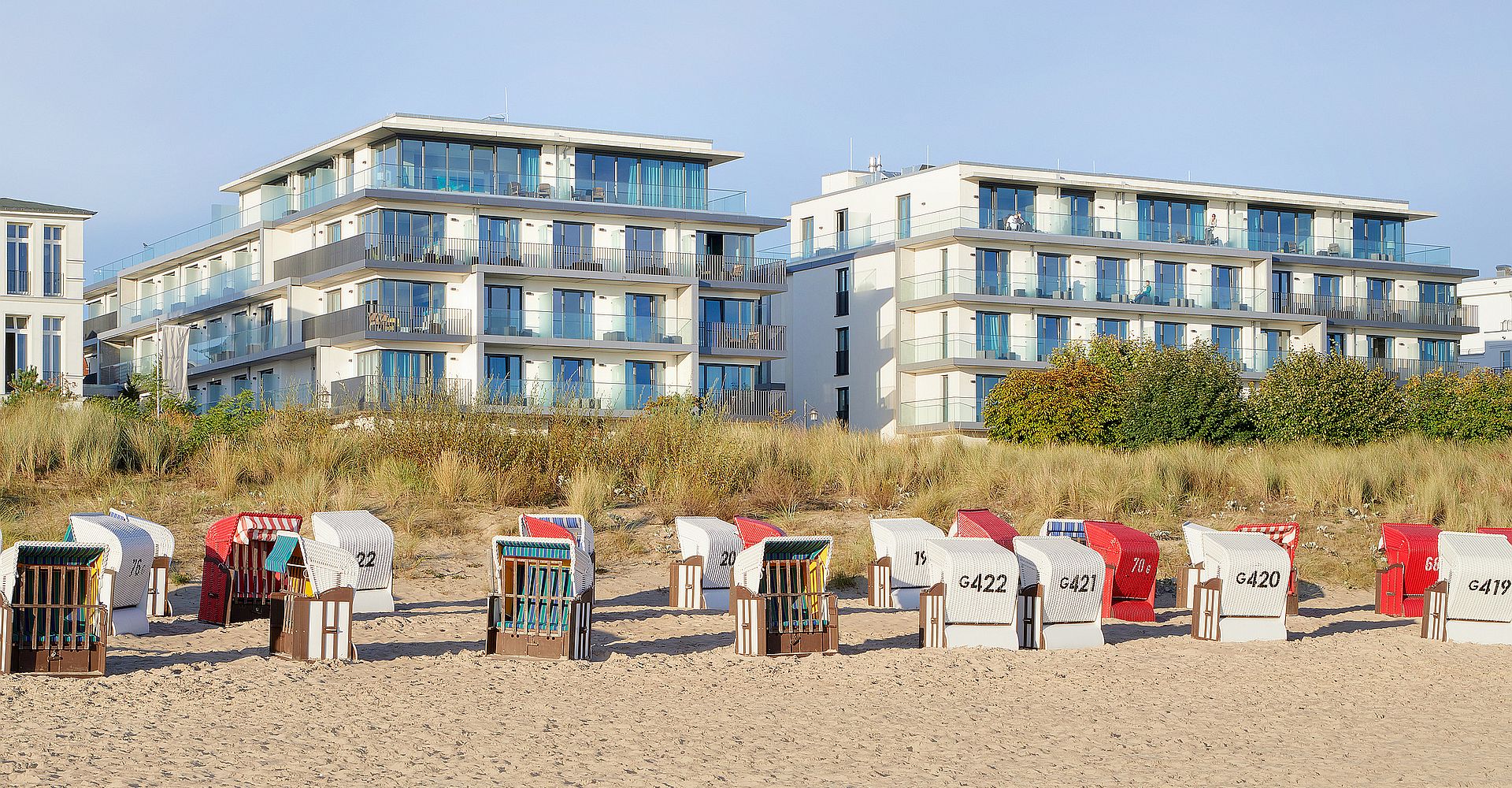 |
| The new Seehotel Kaiserstrand in Bansin on Usedom: rooms with a dream view and empty beach chairs. / Photo: Seetelhotels |
Ahlbeck (April 16, 2021). Many politicians have long since lost their image as role models - and they don't tell the truth either. "Grants for us are referred to as gifts," Rolf Seelige-Steinhoff, CEO of Seetel, says angrily, referring to the German government in Berlin. “These are sleights of hand." Not least because the state itself earns massively from each aid payment.
Speaking in an interview with hospitalityInside, Rolf Seelige-Steinhoff and his Chief Executive Director Walter C. Neumann uniformly describe the entire situation as an economic disaster and criticise the decisions emerging from the German federal government as chaos.
With 16 hotels and over 500 employees, Seetel is the largest hotel group and the biggest employer on the holiday island of Usedom, whose only major source of income is tourism. As an entrepreneur and sharp numerical analyst, Seelige-Steinhoff has gained respect and a solid reputation over the years. He has received many awards and always strived to find solutions in even the most hopeless situations. He was, for instance, the first hotel entrepreneur to set up his own test centre on Usedom last year.
Now, even he has had enough. He and his colleague Walter Neumann give a clear and critical summary of the current situation.
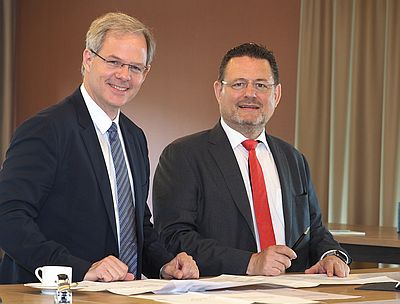 |
|
| Rolf Seelige-Steinhoff (left) and Walter C. Neumann: Zero perspective ruins a life's work. / Photo: mandy knuth photography |
Two weeks after Easter, in 2021: What's going on on Usedom?
Nothing. Where there are no business travellers, life is 99% dead. Hotels have now been closed for over 230 days and the industry has been closed for six months straight. And we still have no prospect of being able to open anytime soon. The behaviour of politicians has made it clear to us above all else that they simply have no idea what they’re doing. When they talk of emergency brakes and measures to be taken, they don’t even bother to apply them themselves. Many politicians have long since lost their image as role models - and they don't tell the truth either.
The Chancellor recently let a sentence slip that sounded a little bit snide, along the lines of 'Oh yes, I'll open the hotels too one day...' Does that depress you?
The hotel sector has been treated with total contempt by the government (editor's note: a coalition of CDU/CSU and SPD). At the state level (editor’s note: SPD-led), on the other hand, I can praise the cooperation on some points and regionally it works very well: Weekly video conferences keep hotel colleagues on the island, tourism stakeholders and associations together.
And we present a face to the outside world: Our colleague and Dehoga boss Lars Schwarz has held demonstrations in front of Schwerin Castle for four weeks with 200 people, the maximum number allowed. Minister President Manuela Schwesig was also there and now also brings people from the grassroots into her workshops. And we as Seetelhotels Group also helped to create the sad banner motif (see photo). Many people in the region have copied the banner. Up here on the Baltic Sea, the distances are short, so something can still be done.
As a small hotel group with only 16 hotels, you were the first to file a complaint with the Federal Constitutional Court in December against the violation of fundamental rights (exercise of freedom of profession). The Court refused to hear the case, without reasons - something which only the Constitutional Court can do. What's happening now?
We have begun the journey through the lower courts. This is going to be fun. Our case has currently made its way from the Administrative Court in Berlin via Bonn to the Administrative Court in Cologne and is now about to return to Berlin. The courts don't seem to agree on the question of jurisdiction. Everyone keeps shifting the buck.
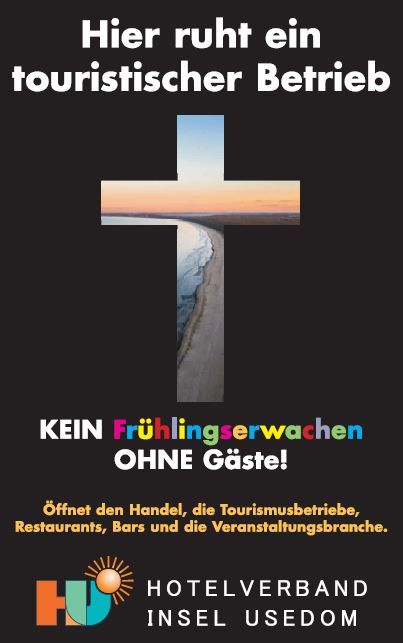 |
|
| The provocative poster from Usedom attracted attention in all hotels and social media. It says: Here a touristic enterprise rests in peace. / Photo: Hotel Association Usedom |
Responsibility in this matter is of primary importance: The issues to be determined focuses on to what extent the state may completely restrict individual commercial sectors of the economy, not only in terms of freedom of profession, but also in terms of property rights. The state does not want to pay compensation in the pandemic either. This is no way to treat the citizens of a democratic country and is a clear violation of our fundamental rights.
Everyone seems to be playing for time to avoid responsibility. Do you see this German dithering also in the financial aid that the government has supposedly spread so generously across affected industries?
The public at large is repeatedly given the message that Berlin is generous with the handouts, that "they’re spreading the aid thick" - but that's quite simply not the truth. Even the grants we receive are described as gifts - that is a deliberate misrepresentation!
In truth, all these 'lost grants' must be included on the income statement and are therefore subject to tax. Even though there are several ways to account for such grants, tax always makes an appearance somewhere. It is a liquidity aid, but it is completely booked as revenue. If, for example, a hotel were to achieve a result of zero due to corona and then receive a grant of €200,000, the annual result would be positive and taxable. But the repayment would still have to be made from it.
These are sleights of hand! We are given help described as a gift, but all we get is liquidity support and only months later at that. That's all it is!
And what about KfW loans?
We, too, have signed KfW loan agreements and, like many of our colleagues, only realised after the event that certain laws had an impact for us. To the extent that for terms of more than 6 years, the loan was assessed at face value and deducted from the subsidy!
So the state, or rather the Ministries of Finance and Economic Affairs, don’t even consider the desperate sitation entrepreneurs are in?
No, the state is actually using the crisis to its own advantage. It's the winner from this crisis. In May 2020, it issued billions in debt at around -0.4%, it then established programmes for small businesses at 1% and quick loans with 100% exemption from liability for 3%. On average, this results in an interest rate of around 2%.
This means that the state generates considerable interest income via the loans and the money flows back. So, one could ask, what does the state actually provide us with in terms of aid? The same is true for state guarantees. We entrepreneurs also pay interest for this - and in no case does money flow from the state. Only in the event of the economic failure of a company does the state pick up the bill and the precisely the state would be partly responsible for that.
My conclusion: The entire situation is disaster in terms of economics, which is precisely why we never see a sensible economist.
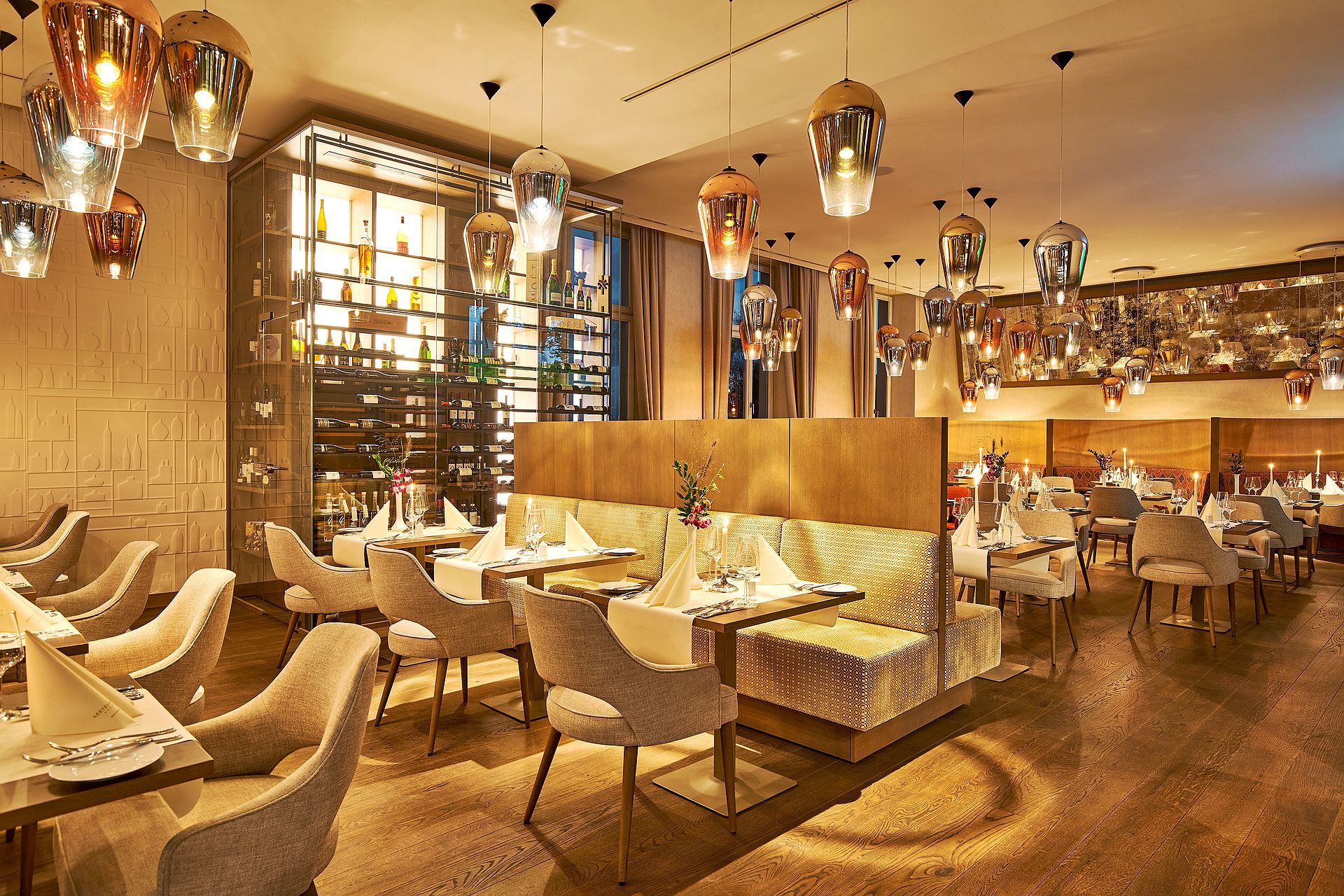 |
|
| Strandhotel Altanic in Ahlbeck: High-quality ambience, zero guests. / Photo: Seetelhotels |
And how has the state behaved with regard to the emergency aid that was so generously predicted at the beginning?
Our Seetelhotels Group has received emergency aid of just over €200,000. Due to our size, we first had to clarify at the national level whether we should submit individual applications for the hotels or for the entire company. On submitting our application on 7 April, the 3-month deadline began to run (until 7 July). And now we learn that the result must be considered in the period - and the Ministry of Finance announces subsequent reviews and threatens to demand repayment.
This is also scandalous! Emergency aid was made available first and everyone assumed they would not have to pay it back. And now Finance Minister Olaf Scholz is also demanding that these sums be paid back during the pandemic period! That's what I call bazooka, Mr. Scholz!
In summary: Seetel has received €2.4 million in aid since March 2020 - and that's in the face of a loss of earnings of more than €10 million last year. The aid does not cover the fixed costs. Congratulations, long live politics!
The hospitality industry never appears in the economic statistics. Does that bother you?
Yes, of course! As the sector deteriorates even further due to strict closures and the ongoing lockdown, not only is our industry crumbling away, but so too is our supply chain. This must really show up as a decline in GDP, but it doesn't. This means that an industry with 2.4 million jobs and which recorded net turnover of some €60 billion in 2020 (according to Dehoga) does not play a role.
In 2019, accommodation and restaurant services contributed 5.6% to GDP, but in 2020 that has slumped to 3.9% (according to the Federal Statistical Office). It is often overlooked that this "small", admittedly low-margin sector - like the retail trade - is of disproportionate impact in the labour market and in its role in society. Those who destroy the hotel and catering industry risk tearing apart the social fabric.
Since the election campaign (with the decision on 24 September) has now started in earnest, it is unlikely that realistic proposals for solutions and few prospects for the German hotel industry can be expected.
The parties shamelessly exploit the issues like aid, grants and loans to create sentiment as well. Even from leading German media, little support is to be expected; they do not understand the complex financial interrelationships or do not want to delve deeper.
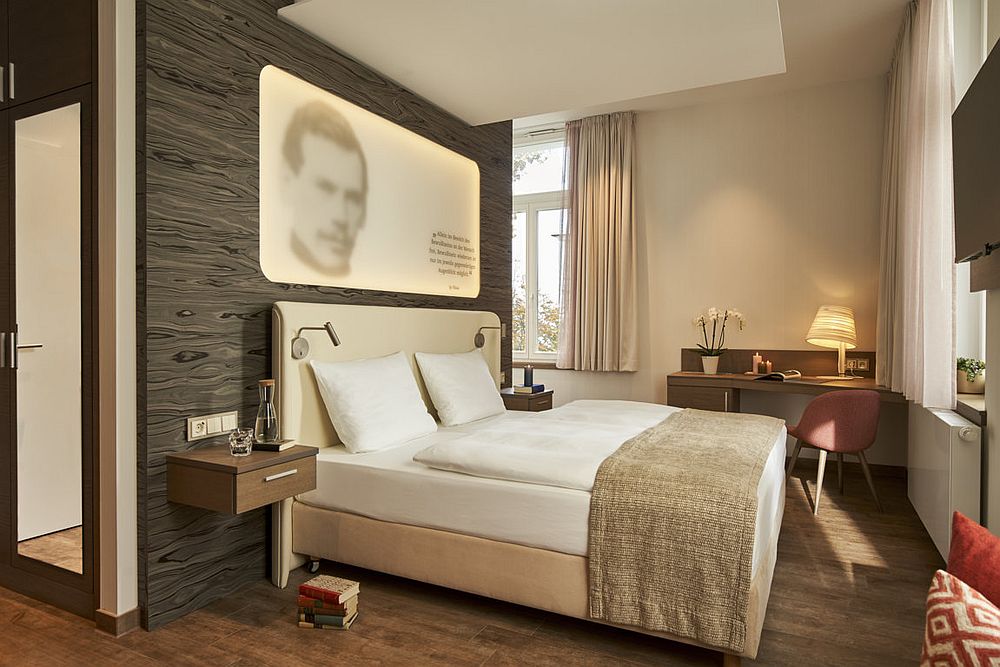 |
|
| 4-star comfort as German holidaymakers like it. For that they have to fly to Mallorca now. / Photo: Seetelhotels |
I think there's a race going on in Germany right now to distribute private wealth. Some party manifestos clearly aim in this direction - they want to punish entrepreneurs, simply take away their life's work and their assets. I have real problems understanding such policies in a democratically elected country.
Of today's politicians, as well as those now standing for election, virtually no one has a profound knowledge of economics and finance, or even of the hardships of an entrepreneur. No one has a sense of what it means to pay salaries every month, to pay all of their loan payments on time in a crisis, or still get their rents/leases together without income.
Politicians don't know what's happening on the ground. They always refer to case-by-case consideration. And that alone shows they have no clue about practice.
When will the hotels open? For the Whitsun holiday (23 May) or not until June or July? And how many fewer hotels will there be by then?
So far, there is still no comprehensible concept that explains under which conditions we can open a hotel. Without a clear destination, there is no clear path. Model projects, for example, are an interesting concept. Once infection rates fall below 100, it would be possible to gain experience in small clusters (municipalities, small towns) by opening them up to high hygiene and safety requirements. The models can then always be readjusted further.
It would be a sensible path to take and would lead to a quicker exit from the crisis than weeks more of empty debate.
Many thanks for your time!
Interview: Maria Pütz-Willems


